By Mahnoosh Arsalan
Correspondent
The exploration of human nature and emotion exemplified through inhumane tactics and fantastical, rebirthed creations magnify the intricacies of both life and death in Guillermo del Toro’s newest creation “Frankenstein.” Along with life and death, purity, autonomy and cruelty are just a select few themes del Toro hits in his adaptation of Mary Shelley’s great epic from 1818.
Del Toro’s “Frankenstein” hit select theaters Oct. 17 and came to Netflix Nov. 7. Plus, “Frankenstein: The Anatomy Lesson,” a behind the scenes look at the film is now on Netflix.
The film stars Oscar Isaac as Victor Frankenstein and Jacob Elordi as The Creature, along with an ensemble of talented actors such as Felix Kammerer, Mia Goth and Christoph Waltz.
As a great lover of Shelley’s original tale, hesitancy was expectedly evident when seeing this film. But, del Toro’s ability to take such an iconic written piece and bring it to life with as much chaos and beauty that Frankenstein brings The Creature to life is groundbreaking.
With that said, the film had a hard time not straying away from the original, but that was a given. How can you create something so identical and accurate to something original while still being commendable and unique? With any other director, this film could have been a nice but struggling adaptation. Del Toro transformed what could have been into a film and book lover’s utopia, a beautifully heartbreaking adaptation.
Isaac portrayed a madman like Frankenstein with care and dedication. Frankenstein is a complex character. You empathize with and understand his insanity while also recognizing his deep flaws and hating him at times. Isaac took this concept and perfectly executed it.
Frankenstein is a troubled man who has suffered, lost and experienced all facets of life. His craziness, though not justified, makes sense considering his past, yet his choices of dealing with his wounds are what truly harm the people in his life, including himself.
Elordi epitomizes The Creature. With a role so demanding, he completely becomes Frankenstein’s creation. There are tremendously high levels of sadness and nuance within that sadness in The Creature, as well as purity and innocence. The Creature is new to the world and is experiencing the fight to survive at such a fast pace, he’s truly doing the best he can.
The film allows The Creature to tell his side of the story, which ultimately brings the audience so much closer to him. As an audience member, you can only expect the worst to happen throughout the course of the film. The Creature doesn’t recognize any of that, or even anticipate it, which enhances the ongoing theme of innocence.
The first half of the film encapsulates Frankenstein’s exigence for his experiments, as well as his execution. The second half of the film focuses on The Creature’s new life and tumultuous journey. It was extremely interesting to see the two’s juxtaposing values and thoughts on life and love, with Frankenstein being more villainous and The Creature being more pure and humane.
A big theme in the film relies on this idea of Frankenstein being a villain rather than a caretaker towards The Creature. Without spoiling too much and going into a full analysis of this, Frankenstein’s deep wish to create life in place of his trauma makes him play God and harm his own creation, mirroring his own tortured father-son relationship.
Lastly, the production and set design of this film should not go unnoticed. The sheer scope of design done to bring the world of “Frankenstein” alive is so extremely impressive.
“Frankenstein: The Anatomy Lesson” dives into how each person on set contributed to the making of the film, from the sets to the makeup. The film was not just amazing due to great performances and efforts from the cast and director, but due to the collaboration, curiosity and love for bringing out the best in film.
Ultimately, del Toro has given viewers a new classic. From rich dialogue to tear-jerking performances, “Frankenstein” is a monumental feat in del Toro’s filmography,
“And having reached the end of the world, there was no more horizon and the achievement felt unnatural.”







